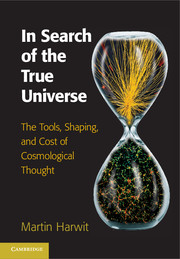‘A fascinating and scholarly personal take on the explosive development of astrophysics and cosmology in the twentieth century that connects the untidy nature of scientific discovery to the economic, social, and political context in which it took place. In Search of the True Universe will enlighten and stimulate scientific historians, sociologists and, especially, professional astronomers and physicists striving to plot the best course for the field in the twenty-first century.'
Roger Blandford - KIPAC and Stanford University
‘Refreshing wisdom and insight concerning the status and future of cosmology from one of its most broadly experienced and thoughtful practitioners. Martin Harwit entertainingly frames the challenges and opportunities facing twenty-first-century astronomy and astrophysics in the context of historical scientific knowledge, organizational behavior, personalities, leadership, policy, and increasingly constrained economic environments. Important insight for those considering working in this area and an essential read for those already engaged.'
Frank Martin - former Director of Astrophysics, NASA
‘Martin Harwit's penetrating analysis of the progress and problems of modern astronomy and astrophysics is refreshingly original. The astronomical sciences have advanced tremendously during the twentieth century but are currently faced by challenges that cannot be answered by means of traditional tools and methods. As Harwit points out - and illustrates by carefully examined historical case studies - the tools available to us in any given period shape the way we conceive the world. While new tools are essential for further progress in the search of the ‘true universe', they need to be coordinated with new forms of the societal forces that so thoroughly influence science. Harwit's book is not only a fascinating description of major advances in astrophysics, it also uses history to offer proposals for the future, both when it comes to the tools and the organization of astronomical research.'
Helge Kragh - Aarhus University
'I recommend In Search of the True Universe on several levels: it provides great insights into the history of some important astronomical discoveries; it provides great insights into the process of scientific discovery; and it provides great insights into the process of guiding and funding scientific research.'
Source: American Journal of Physics
'In Search of the True Universe throws a clear and needed spotlight on the complexities of conducting science in a political world and within the funding framework of Western Society … the book ought to be read by every student and professor of science … Harwit has captured the recent past to allow us to reflect on how we might do better in the future.'
Source: Physics Today
'The book is well written, presents some familiar themes in a new light as well as some ideas which will be new to many readers, and allows the reader a glimpse behind the scenes which only Harwit could provide … I recommend the book to all interested in the sociology and politics of science or the last hundred years of astrophysics.'
Source: The Observatory





